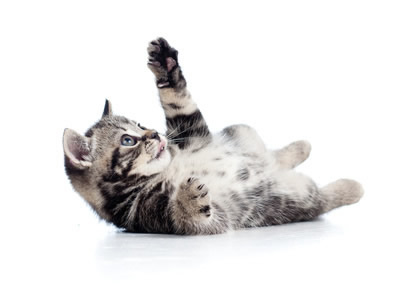Kitten Care
 New Kitten Advice Page
New Kitten Advice Page
Getting a new kitten can be a very exciting event but it is important to be aware of how to care for your kitten and help them grow into a healthy adult cat. This advice page gives information on the important aspects of healthcare for your new kitten
Choosing a Kitten
The majority of pet cats are a domestic cross breed or ‘Moggy’. They can vary widely in their colour and in their adult size. Some owners prefer pure bred cats such as Siamese, Bengal, Burmese, Ragdoll or Persians.
If you are considering a purebred cat and are not familiar with the breed it is advisable to speak to your vet first about any health problems they may be more prone to.
For example Persian cats can suffer from upper airway problems due to their facial conformation and can have hereditary polycystic kidney disease. Some purebred cats can be harder to handle, particularly Bengal due to their close relationship to the wildcat ancestor.
Cats can be quite independent pets but they usually enjoy company of people or other cats.
If the cat is likely to spend a lot of time alone at home it may be advisable to get two kittens together to provide company for each other.
Bringing your kitten home
It is worth preparing your house before the kitten arrives. They will need food and water bowls and separate space for litter trays.
It is worth asking the breeder what type of litter they used for the mother as kittens will learn toilet training at a very young age but may only recognise the litter they have been familiar to. Kittens can be very playful so toys may be advisable to help direct their play behaviour away from curtains, furniture etc (making sure these toys are not easily chewed/destroyed).
Scratch posts can also help to prevent scratching behaviour on furniture. Initially it may be best to keep the kitten in one room until they become accustomed to their new surroundings. Pheromone sprays such as feliway can help with put them at ease with this transition in the new home.
Other pets should be introduced gradually and for short periods initially, starting with contact by sight and scent first before physical contact.
Until fully vaccinated and ideally until they are neutered your new kitten should be kept indoors (see later information). Even if they come to you as an older kitten and have been neutered and vaccinated it is advisable not to let them out for a couple of weeks until they are familiar with their home and will readily come back in after periods outside.
Vaccination
There are several serious diseases which can be prevented by vaccination in cats
- Cat flu complex – cat flu is caused by a mixture of viruses and bacteria, vaccines protect against feline rhinotracheitis virus and feline calicivirus. Symptoms vary widely including sneezing, nasal discharge, mouth ulcers, and conjunctivitis. In severe cases cat flu can cause dehydration and starvation as cats are unable to eat or drink, they therefore need prompt veterinary treatment. This disease is easily spread between cats making vaccination very important. If cats or kittens become infected before vaccination the viruses can remain dormant in the body after the infection appears to have cleared, leading to repeat episodes of flu type signs later in life at times of stress or lowered immune system
- Enteritis – Feline panleucopaenia virus is a highly contagious virus causing vomiting, diarrhoea and suppression of the immune system. Severity can vary but can cause severe and rapid dehydration and sometimes sudden death. Kittens infected before birth can have permanent deficiency of their immune system and poor development of parts of the brain causing a strange gait and tremor.
- Feline Leukaemia Virus(FeLV) – this virus is spread by cat to cat contact, particularly by saliva when cats groom each other. While 40% of cats will clear the infection, 60% of cats (particularly those infected under 16weeks of age) will be infected long term either permanently shedding the virus or with the virus dormant in their bone marrow. Although infection usually occurs as a young cat the problems caused by FeLV are often not shown until later in life. Infection can lead to anaemia, lymphoma, leukaemia and suppression of the immune system leaving cats open to other infections. Less common complications of FeLV infection include bloody diarrhoea and nervous system signs.
Vaccination can be started at 9 weeks of age and involves a primary course of two injections 3-4 weeks apart.
All vaccine courses will involve vaccination against cat flu and enteritis as these are highly contagious diseases. Owners can decide whether they also want the vaccination course for their cat to include FeLV cover.
Given the complications which can result from infection this is usually advisable. The exception to this may be isolated indoor cats who are at low risk of infection. Vaccination against FeLV can be started later on in life but will not be effective in cats that are already infected.
These cats should ideally be tested before vaccination, but mostly if they are otherwise healthy it can be assumed the risk of them carrying the virus already is fairly low.
After this primary course booster vaccination is given yearly. This visit also provides us with an opportunity to give your cat a health and weight check. Side effects of vaccination can occur, usually in the 24 hours after injection, and are more common in kittens than adult cats.
Usually this is only mild lethargy but some can show discomfort over the injection site or develop a temperature. If you notice these signs after vaccination and are concerned please get in touch with one of our vets.
Worming
Kittens acquire Roundworms from their mothers while they are developing. Tapeworm can be picked up once they start to go out, particularly from hunting.
To prevent these from causing a problem for your cat and to prevent transmission of these to people we recommend regular worming.
Hopefully this will have started with the breeder from 2 weeks of age, after this we recommend worming every 2-3weeks (with Panacur/Milpro/Prinovox) up to 12 weeks of age, then every month up to 6 months of age.
From 6 months of age worming should be done every 3 months, or every 6-8weeks if they are a frequent hunter. Which product is used depends on size, breed, age and how easily they take tablets.
We are happy to advise on the best wormer for your cat. As they are dosed on a weight basis it is useful to bring your cat in to be weighed at the time or weigh them at home and write it down for us.
Fleas
Fleas can arrive with your kitten or they may pick them up from other animals once they come to their new home. Once your animals have adult fleas they will breed and set up a life-cycle within your home.
The majority of this life-cycle is in carpets, bedding etc making it more difficult to deal with. We advise you treat your pets regularly to prevent fleas becoming established in your home and on your animals.
A variety of products are available (Bravecto, Effipro, Stronghold, Prinovox, Advantage, Vectra) as a spot on applied to the skin on the back of the neck.
As there are some dog flea and tick products which are very toxic to cats (permethrins) we advise that you only use those made for cats.
Feeding
Kittens have different dietary needs than adult cat so they should be fed a complete balanced kitten food. From a year of age they can be changed to an adult cat food.
The amount of food given to adult cats should be adjusted to make sure they maintain a good bodyweight, the vet will be able to advise you on a target weight for your cat.
It is very important they do not become overweight as this can lead to other problems later on in life such as diabetes and can worsen conditions such as arthritis and heart disease.
Cats have many specific dietary requirements, for example meat protein, taurine and restricted vitamin A. These need to be met by complete commercial cat foods, home cooked diets are not recommended as they can lead to deficiencies. The choice between wet and dry food varies with the situation.
Dry foods can be beneficial in keeping tartar on teeth under control and is also easier to leave out all day for cats that do not eat at set times. However, cats fed on only dry food often do not drink any extra water to compensate for the low water content of the food.
As a result the concentrated urine can irritate the bladder and lead to episodes of cystitis. We recommend that neutered male cats, and any cat that has had previous episodes of cystitis, should have wet food in their diet to increase their water intake and dilute their urine (see notes on common health problems below)
Neutering
Cats can start breeding from 5-6 months of age and are very well adapted to produce frequent litters of kittens.
Unless you are planning to breed from your cat it is advisable to have them neutered at an early age to prevent unwanted kittens.
In addition to the benefits of neutering controlling the cat population there are other advantages to neutering your cat. Male cats that have not been neutered are more prone to straying and fighting.
Female cats that have not been spayed can come into season every 3 weeks for at least 9 months of the year, during which time they can show very noisy ‘calling’ behaviour and may have unwanted attention from tom cats in the area.
Cats can be neutered from 5 months of age.
Microchipping
This is a rice grain sized microchip inserted with a needle under the skin between the shoulder blades. This has a unique number which when scanned allows your cat to be identified.
If your cat ever accidentally strays and is brought in to a veterinary surgery it can then be re-united with you. We can do this from any age but usually we will insert them at time of neutering.
Common Health Problems
We hope that the advice on preventative treatments and nutrition will help to keep your kitten (and the cat they grow up into) healthy but there are some common illnesses worth mentioning.
- Abscesses – outdoor cats, particularly young un-neutered males, can often fight with other cats. Bites and scratches can introduce bacteria under the skin which can form abscesses. These may initially be small puncture marks not evident to the owner until several days later when the abscess bursts out.
- Road Traffic Accidents – this is a very common cause of injuries in young cats, particularly those that spend a lot of time outside at night. Injuries can range from leg and pelvic fractures, skin wounds and head trauma.
- Urinary Obstruction – blockage of the outflow to the bladder can be a very serious condition, mainly seen in neutered male cats fed on dry food only diets. Cats on dry food tend to drink a similar amount of water to cats on wet food, leaving their urine stronger and their bladder more prone to irritation, cystitis and formation of urinary crystals. Any sediment from inflammatory cells or crystals can easily block the narrow outflow from the bladder (the urethra) in male cats. If this happens urine build up can quickly damage the kidneys and rise in potassium levels can be life threatening. These patients can become very ill quickly so it is important that you contact your vet urgently if you notice any sign of difficulty or pain passing urine, blood in the urine or an increased frequency of passing urine. Female cats can also get cystitis, which causes straining, discomfort and blood in the urine but as their urethra is wider they are less prone to blockage. It is still important to bring female cats in to be checked by the vet if you notice any urinary problems as cystitis can be a very painful condition.
- Kidney Disease – Deterioration of kidney function can be seen in older cats (usually over the age of 10-12years). Signs an owner may notice would be an increase in thirst, weight loss and later on in the process a reduction in appetite. If you notice any of these signs we can check kidney function with blood and urine tests and may need to check your cat’s blood pressure. While kidney function is unlikely to improve we can try to stabilise the deterioration with medications and prescription diets.
- Diabetes – This is also a condition seen in older cats, particularly those that are overweight. Owners may notice weight loss, increased thirst and increased appetite. It can be diagnosed by blood and urine tests and needs treatment with insulin injections
- Overactive thyroid – A common disease in cats over 10 years old. Over production of thyroid hormone causes an increase in metabolic rate so often cats are eating ravenously but losing weight. Many hyperthyroid cats also have increased thirst. Untreated can lead to heart failure and retinal detachment. It can be diagnosed by blood tests and there are both medical and surgical options for treatment
Pet Healthcare Club
The club also enables costs to be spread over the year by a regular monthly payment. It includes yearly booster vaccinations, year round flea and worm control, nail clipping, microchipping and a six monthly health check.
Pets in our Pet Healthcare club also benefit from a 10% discount on dentistry, food and neutering. For more information please speak to one of our staff or visit Pet Healthcare Club.
Insurance
Insurance is an important consideration for your new pet, allowing you to cover them for unexpected accidents and illnesses.
Ideally they should cover your pet for the life time of a condition. We can help you take out a four week free policy with Petplan to make sure they are covered from the earliest opportunity





